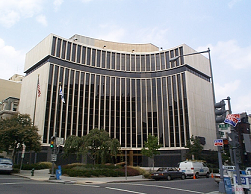NAB to DOJ: Music Licensing Consent Decree Decision Was Right Call

The National Association of Broadcasters has told the antitrust division of the Justice Department that it was correct to conclude that it does not need to modify the ASCAP and BMI consent decrees that circumscribe how performance licensing organizations (PROs) like ASCAP and BMI collectively negotiate the rights to music on TV, radio and the internet.
That came in comments to DOJ.
ASCAP and BMI aggregate rights from a host of musical works and provide a blanket license for their performance at a single price, regardless of whether an individual work is actually performed. Without the consent decrees, which were struck with the Department of Justice in 1941 following complaints of anticompetitive activity, broadcasters argue, such control over music licenses would be a de facto antitrust violation.
Under the current system, TV stations pay $150 million per year and radio stations $350 million to songwriters and publishers, according to NAB.
According to the Future of Music Coalition, the DOJ informed songwriters and composers that it was leaving the consent decrees intact and interpreting them to mean that ASCAP and BMI have to provide 100% licensing, which the coalition called "upending existing practices"
"The decision imperils songwriters’ ability to freely collaborate," the coalition said. "And it creates new conflicts and challenges with international PROs, and potentially with international law and treaty obligations.
"It seems certain that more of the performance royalties generated by digital services will get tied up in new administrative costs. Furthermore, payments themselves may go down as a consequence of race-to-the-bottom 'rate shopping' by licensees—an unwelcome outcome for songwriters already struggling with low royalty payouts from digital streaming services."
Broadcasting & Cable Newsletter
The smarter way to stay on top of broadcasting and cable industry. Sign up below
Music publishers have been trying to selectively get out of the BMI/ASCAP regime so they could independently negotiate with digital suppliers like Pandora, arguing they are being undervalued in digital play.
NAB strongly disagreed with the coalition's assessment of the decision's impact. It said it was the music industry that was trying to modify the longstanding practice of 100% licensing by trying to offer only partial copyright for jointly-owned works. "Allowing this practice would be anticompetitive, would undermine the very rationale for ASCAP’s and BMI’s existence, and would significantly disrupt the day-to-day operations of local radio and television stations," NAB said.
"Broadcasters would need to locate and secure licenses from countless other rights owners, an impossibly expensive and practically infeasible task that would expose them to potentially ruinous copyright infringement claims."
NAB said there was no reason to anticipate license "turmoil" following the DOJ decision.
Contributing editor John Eggerton has been an editor and/or writer on media regulation, legislation and policy for over four decades, including covering the FCC, FTC, Congress, the major media trade associations, and the federal courts. In addition to Multichannel News and Broadcasting + Cable, his work has appeared in Radio World, TV Technology, TV Fax, This Week in Consumer Electronics, Variety and the Encyclopedia Britannica.

